Recent research shows that a sense of school belonging has been on a steady decline1 and that social isolation, bullying, and stress remain at the forefront of parents’ worries about their children’s well-being2. The growing mental health crisis among youth demands that those of us who work with and care about young people learn to be effective advocates for our students—and that we teach our young people how to advocate for themselves, develop meaningful relationships, and contribute to their communities. This understanding has led schools to think differently about their school climate and how to assure a safe and supportive learning environment where all students can thrive. One approach to cultivating positive climates is to shift focus away from reactive practices and toward more proactive, school-wide approaches designed to foster vibrant and welcoming school communities.
Looking for new ways to build a positive school culture, Bow Memorial School, a midsize public middle school in Bow, New Hampshire, discovered One Trusted Adult programs. After successfully implementing first the educators’ professional development on becoming accessible, boundaried, and caring advocates for students and then the Ripple Journal advisory program, Bow Memorial’s counseling department was excited to do even more for their 500+ students.
Beth Corkum, a former school counselor and current Coordinator of Wellness & Equity in School Administrative Unit 67, together with the team at Bow Memorial, turned to Ripple Middle School Student Leadership training, a program designed by One Trusted Adult to teach students specific strategies for building belonging and exploring opportunities to positively contribute.
Both academic research and the day-to-day observations of educators underline the fact that adolescents’ peers have a substantial influence on their lives. Rather than discouraging this influence, the Ripple Student Leadership training endorses harnessing it to the benefit of students and their communities. When we adults partner with students, invite their ideas and voice, and make room for them to lead, we see far greater and faster improvement to school culture.
For Beth and her team, it wasn’t enough to say that a positive school culture is important; they wanted to take ownership of this goal and share it with students in a fun and engaging way. The school counseling team was looking explicitly for ways to build relationships, create common language, and increase feelings of safety and belonging for all students.
Like other educators and school counselors across the country, the educators at Bow Memorial are limited in their time and resources. The Ripple Student Leadership training aligned with their priorities as a school and their need for a structured yet flexible program that helps them get the most out of their time with students. Among the program’s aspects that worked well for Bow Memorial were:
- Minimal teacher/counselor prep
- High student engagement via activities and reflections, enhanced by a printable student reflection guide
- Content tailored to different types of learners
- Flexible curriculum, which can be broken into four different time blocks and adapted for different-size groups
- Expansive and inclusive definition of leadership that highlights opportunities for contribution for all students
- Specific strategies for building connection and belonging
- Tools and techniques that teach honest self-assessment, accountability and responsibility, conflict resolution, and how to identify supportive resources
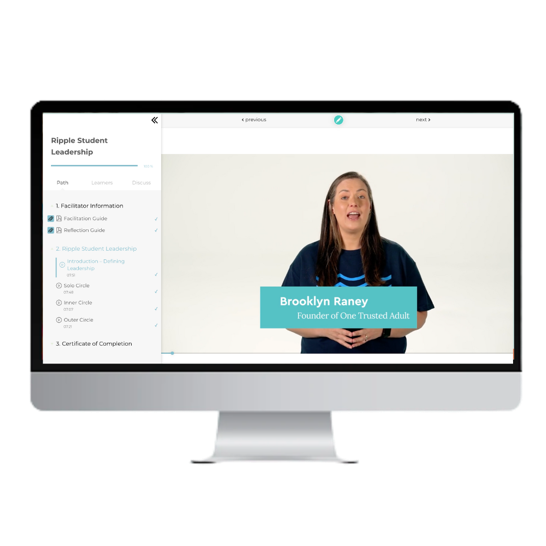
Unlike traditional leadership programs, which focus primarily on individual growth among a small group of students chosen for or elected to a role, the Ripple Student Leadership program emphasizes leadership as a mindset and a skill set that all students can embrace. This approach aligned well with the goals of Beth and her team, who prioritize inclusive practices, and who wanted to make the program accessible to all.
“A step-up, step-back mentality is central to the Ripple Student Leadership program; it means that leadership can look like stepping up to offer your unique strengths, gifts, and experiences, or it can mean stepping back to make space for someone else. Both are signs of a strong leader.”
—Brooklyn Raney, founder of One Trusted Adult
At Bow Memorial, the pilot program included 24 fifth and sixth graders who met for four 45-minute sessions over a two-week period (two sessions in one week and two the following week). Sessions were organized around the following structure:
Group Check-In Chat
Recap of Previous Session
Video
Reflection
Activity
Summary & Group Cheer
Of the new program, Beth says: “The Ripple Leadership four-module program is making it easy (and fun!) to train all middle schoolers in our building to lead with a step-up, step-back mentality and to make an action plan for making a positive difference at school and beyond.”
A closer look at Bow Memorial School’s pilot participants:
- 24 students
- 75% 5th graders / 25% 6th graders
- 13 female / 11 male
As part of their pilot year, Beth and her team documented their experiences and the changes that emerged for students in the leadership program. She could see the transformation among participants, but would they see it in themselves? Would the students carry the confidence and skills they displayed during small group activities and interactions out of the classroom and into their wider school community?
In program surveys, students rated their leadership skills and characteristics before and after completing the program. After participating in the program, students’ view of themselves as leaders and confidence in their leadership skills rose dramatically.
How true is this for you?
| Before the Leadership Program | After the Leadership Program | |
| I am a leader | 8% Strongly Agreed | 75% Strongly Agreed |
| I am confident in my leadership skills. | 37% Strongly Agreed | 71% Strongly Agreed |
More importantly, students reported meaningful growth in communication, mentoring, boundary setting, and care for others, all skills that will enable them to contribute to a positive school culture. With 19 of the 24 participants saying they will “definitely” apply their newfound skills to their clubs, activities, and interests, Bow Memorial students now were empowered to take the lead as confident learners and mentors.
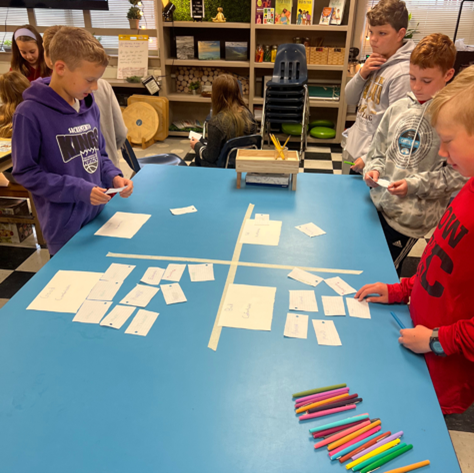
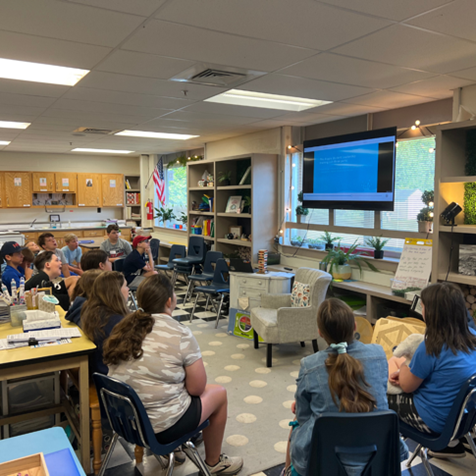
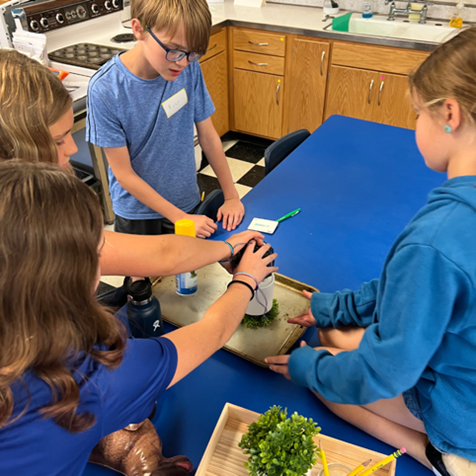
In future years, Bow Memorial plans to draw on the Ripple Student Leadership program to reach more students early in their middle school career, both to bolster their individual protective factors and to foster a community of mentors who create a ripple effect, continually starting schoolwide waves of connection and belonging.
[1] Kuttner, Paul J. “The Right to Belong in School: A Critical, Transdisciplinary Conceptualization of School Belonging.” AERA Open (2023). Accessed November 7, 2023. https://doi.org/10.1177/23328584231183407.
[2] Gramlich, John. “Mental Health and the Pandemic: What U.S. Surveys Have Found.” Pew Research Center, March 2, 2023. Accessed November 7, 2023. https://www.pewresearch.org/short-reads/2023/03/02/mental-health-and-the-pandemic-what-u-s-surveys-have-found/.
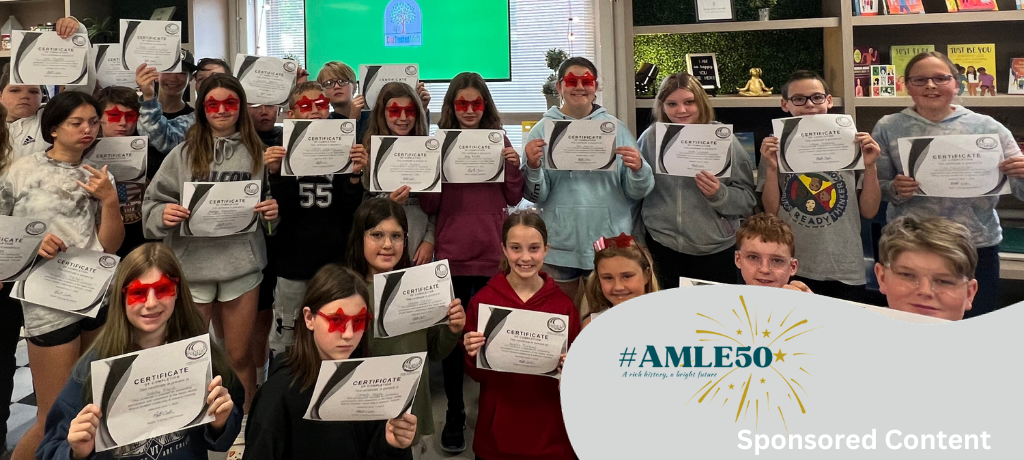
I love this approach to creating a positive school culture! Sharing the responsibility of creating this culture, and being proactive in the creation of an inclusive program that promotes leadership skills for all students is something that I would not have considered implementing. The results are so encouraging! It’s encouraging to hear that the students who benefitted from this program are now going to apply and model those skills for others, essentially teaching their peers the skills they’ve learned.